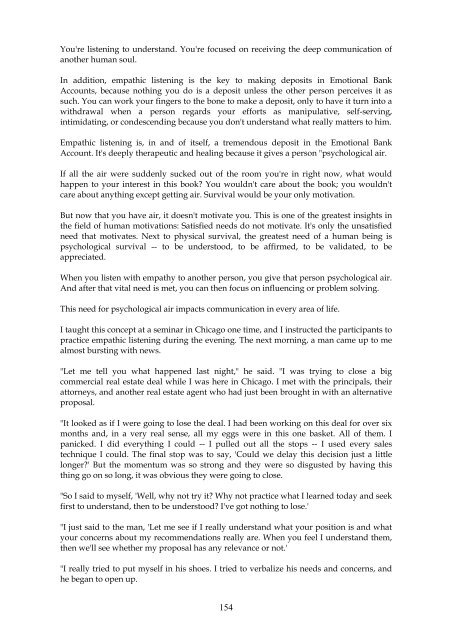Covey - The 7 habits of highly effective people
Create successful ePaper yourself
Turn your PDF publications into a flip-book with our unique Google optimized e-Paper software.
You're listening to understand. You're focused on receiving the deep communication <strong>of</strong><br />
another human soul.<br />
In addition, empathic listening is the key to making deposits in Emotional Bank<br />
Accounts, because nothing you do is a deposit unless the other person perceives it as<br />
such. You can work your fingers to the bone to make a deposit, only to have it turn into a<br />
withdrawal when a person regards your efforts as manipulative, self-serving,<br />
intimidating, or condescending because you don't understand what really matters to him.<br />
Empathic listening is, in and <strong>of</strong> itself, a tremendous deposit in the Emotional Bank<br />
Account. It's deeply therapeutic and healing because it gives a person "psychological air.<br />
If all the air were suddenly sucked out <strong>of</strong> the room you're in right now, what would<br />
happen to your interest in this book? You wouldn't care about the book; you wouldn't<br />
care about anything except getting air. Survival would be your only motivation.<br />
But now that you have air, it doesn't motivate you. This is one <strong>of</strong> the greatest insights in<br />
the field <strong>of</strong> human motivations: Satisfied needs do not motivate. It's only the unsatisfied<br />
need that motivates. Next to physical survival, the greatest need <strong>of</strong> a human being is<br />
psychological survival -- to be understood, to be affirmed, to be validated, to be<br />
appreciated.<br />
When you listen with empathy to another person, you give that person psychological air.<br />
And after that vital need is met, you can then focus on influencing or problem solving.<br />
This need for psychological air impacts communication in every area <strong>of</strong> life.<br />
I taught this concept at a seminar in Chicago one time, and I instructed the participants to<br />
practice empathic listening during the evening. <strong>The</strong> next morning, a man came up to me<br />
almost bursting with news.<br />
"Let me tell you what happened last night," he said. "I was trying to close a big<br />
commercial real estate deal while I was here in Chicago. I met with the principals, their<br />
attorneys, and another real estate agent who had just been brought in with an alternative<br />
proposal.<br />
"It looked as if I were going to lose the deal. I had been working on this deal for over six<br />
months and, in a very real sense, all my eggs were in this one basket. All <strong>of</strong> them. I<br />
panicked. I did everything I could -- I pulled out all the stops -- I used every sales<br />
technique I could. <strong>The</strong> final stop was to say, 'Could we delay this decision just a little<br />
longer?' But the momentum was so strong and they were so disgusted by having this<br />
thing go on so long, it was obvious they were going to close.<br />
"So I said to myself, 'Well, why not try it? Why not practice what I learned today and seek<br />
first to understand, then to be understood? I've got nothing to lose.'<br />
"I just said to the man, 'Let me see if I really understand what your position is and what<br />
your concerns about my recommendations really are. When you feel I understand them,<br />
then we'll see whether my proposal has any relevance or not.'<br />
"I really tried to put myself in his shoes. I tried to verbalize his needs and concerns, and<br />
he began to open up.<br />
154


